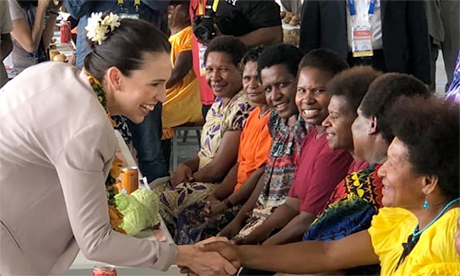In April 2018, Prime Minister Jacinda Ardern addressed the Paris Institute of Political Studies to talk about the impacts of climate change in the Pacific Islands and said: “We are a Pacific nation … New Zealand does not simply sit in the Pacific. We are the Pacific too, and we are doing our best to stand with our family as they face these threats.”
The Prime Minister’s claim that people of the Pacific are “family” to New Zealanders is a remarkably powerful one.
This is not only because family is the most important priority in collectivist Pacific cultures, but also because in making this claim, Jacinda Ardern herself is describing the standard that New Zealand’s foreign policy in the Pacific should meet.
And now with weeks to go until the election, when it looks like our political parties are once again forgetting about pressing issues in the Pacific, New Zealand’s actions (or moreover inactions) in the Pacific need to be judged against this “family” standard now more than ever.
Climate change
To start with, it must be said that even in April 2018, it was clear that the Government did not see Pacific peoples as “family” when it came to climate change.
This was evident with the decision of the New Zealand courts to deport a Pacific man, Ioane Teitiota, facing displacement due to climate change in 2015.
The courts insisted Teitiota and his family could return to lives of dignity in Kiribati, despite compelling expert evidence and heart-breaking testimonies from the family making it clear their particular homes were uninhabitable.
This decision, backed up by the United Nation’s Human Rights Committee in January, means that New Zealand does not offer protection to Pacific peoples facing displacement due to climate change.
But us Pacific peoples have come to learn that we are only seen as “family” by the government and wider society when we win rugby tournaments, or when we receive praise and acclaim on the international stage, or when politicians are seeking clout and political power here or overseas.
Indeed, many Pacific peoples in Kiribati and other low lying Pacific nations wish to live in their homelands for as long as possible.
This explains why many Pacific peoples and governments have rejected mass relocation schemes that have put forward as quick-fix alternatives to climate change adaptation and mitigation.
However, this complete lack of protection in New Zealand means that the small but rising number of individuals and families already being displaced are being forced to endure living conditions that no New Zealand judge would ever deem acceptable for themselves and their families.
Therefore, as leading climate change law experts have urged, the Government must find ways to build on existing immigration frameworks to protect Pacific families like the Teitiota’s.
It must do this alongside providing stronger support for adaptation measures in the Pacific and making more meaningful strides to reduce carbon emissions (which it is still failing to do despite its obligations under the Paris Agreement).
West Papua
Another reason why Ardern’s “family” claim should be treated with deep suspicion is the consistent refusal to take action against abuses and murders of indigenous peoples in West Papua by the Indonesian government.
In summarising the current situation in West Papua, Dr Mark Busse and Sophie Faber note an estimated 100,000 West Papuans have been killed since 1969 in their ongoing struggle for self-determination and independence from Indonesia.
But, despite decades of evidence and graphic images showing the Indonesian government’s abusive treatment of West Papuans, New Zealand has declined to comment on the situation.
In fact, in 2018, Prime Minister Ardern told Indonesian President Joko Widodo during his state visit that New Zealand supported Indonesian control of West Papua.
One of the most painful injustices of New Zealand’s politics of disposability and racial capitalism comes from knowing that if white people from Australia, Europe, North America or anywhere in the world were facing displacement due to climate change or being routinely brutalised and murdered by armed forces – New Zealand would never remain silent because these white people would be seen and treated as “family”.
In August 2019, the Ministry of Foreign Affairs and Trade issued a statement explaining that New Zealand “continues to support the position [on West Papua] taken by the Pacific Islands Forum” that took place that month.
This “position” looked to be a strong one by involving a call for the UN Human Rights Commissioner to go to West Papua within the next year. However, the New Zealand Government has still done nothing to push for this visit and remains silent on the ongoing atrocities.
Activist and author of See No Evil: New Zealand’s Betrayal of the People of West Papua, Maire Leadbeater, notes this inaction is part of a long history of New Zealand’s complicity, where officials have always been “aware of how badly indigenous Papuans were faring under the Indonesian regime…”
But, according to lawyer Cat McLennan, the New Zealand Government is actually very capable of taking action, as seen when they stood up against the Indonesian government to help the people of Timor-Leste gain independence in 2002.
The racism behind the inaction
All this inaction begs the question – why is the New Zealand Government doing nothing in the face of these major human rights crises in the Pacific? In other words, why is it failing to help “family” clearly in need of assistance? Continue reading
